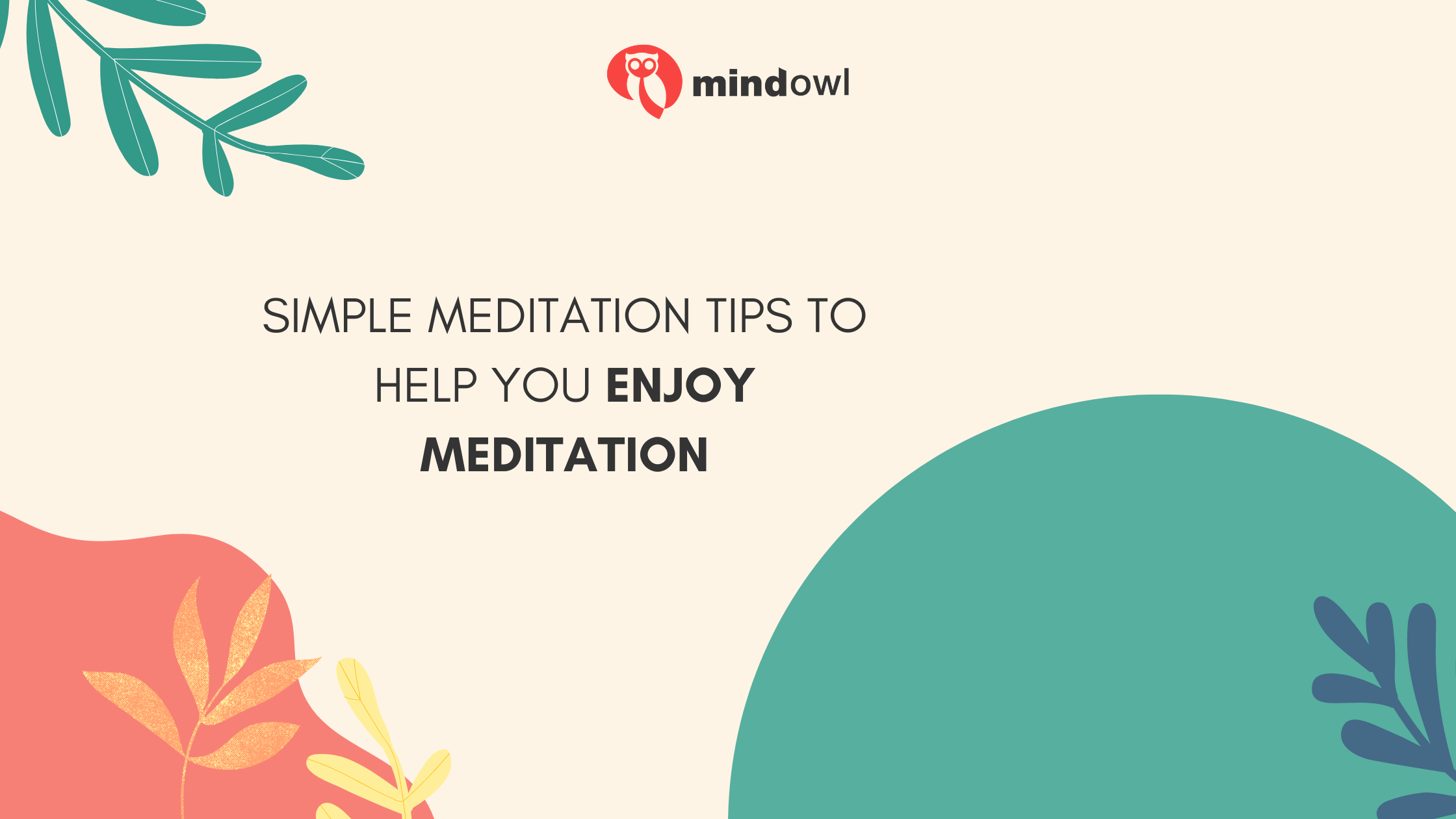Meditation promises a slice of serenity, but let’s be honest – starting can be anything but peaceful.
This blog post is here to guide you through making meditation not just bearable, but something you actually look forward to. We’ll explore simple tips that make sitting down to quiet your mind less of a chore and more like meeting an old friend.
Key Takeaways
- Meditation reduces stress and improves mental health by helping focus on the present and letting go of distractions.
- Different methods like mindfulness, guided meditation, and yoga can make meditation enjoyable.
- Making meditation a daily ritual at the same time helps stick with it and increases its benefits.
- Relaxing music and experimenting with various techniques add fun to meditation sessions.
- Being aware of your body and breath enhances the meditation experience.

Understanding Meditation
Meditation is a way to calm your mind and bring peace to your life. It helps you focus on the now, letting go of worry about tomorrow or regret over yesterday. You learn to pay attention to your breathing, notice thoughts without judgment, and find stillness in moments.
This practice can reduce stress, make you happier, and improve mental health.
You don’t need special equipment or a fancy meditation center to start. A quiet spot and a few minutes each day are enough. Different methods like mindfulness practice, focusing on breath, or guided meditations with apps like Headspace make it easy for anyone.
Whether sitting cross-legged or lying down doesn’t matter; what counts is finding comfort and peace in those quiet moments.
Why Meditate?
Meditation can be a game changer for your mental well-being. Regular sessions are known to lessen stress and clear the mind, leading to sharper memory and better focus. It’s like hitting the refresh button on your brain! Studies show that sitting down to meditate daily can cut down anxiety levels.
This practice boosts your emotional health by improving how you react to stress and enhancing your coping strategies.
Making mindfulness meditation a part of your routine can also boost concentration, mental clarity, and overall happiness. Picture giving yourself a few peaceful minutes each day—this simple act lets you handle negative emotions, like worry, more effectively.
Plus, it teaches you valuable skills in focusing on the present moment and living with awareness. These skills not only help during meditation but spill over into everyday life, making challenges easier to manage and increasing life satisfaction.
Self-discovery through meditation offers a powerful way to understand oneself better. This journey involves connecting deeply with one’s thoughts and feelings, helping to shed light on inner truths.
People often find that regular reflection leads to significant mental and emotional growth.
Using guided reflections is a great start for those new to the practice. These provide specific directions, allowing individuals to focus more on themselves without self-judgement.
The process of emptying the mind helps uncover aspects of oneself previously unnoticed, making space for new insights and spiritual development.
Meditation practice sharpens self-discipline by teaching us how to manage our thoughts and feelings. This control helps in overcoming habits that may hold us back. Through regular meditation, people find it easier to stay away from actions like overeating or procrastinating.
Improved willpower is a big benefit of this process.
Mindfulness meditation makes you more aware of your thoughts and less caught up in them. This kind of awareness means you’re less likely to act on impulse and more likely to make choices that are good for you.
Meditation brings calmness, which also supports stronger emotional self-control. With time, these practices can lead to better overall well-being, making it simpler for many individuals to stick with healthy habits and avoid those that are not helpful.
How to Make Meditation Enjoyable
Try different yoga poses and experiment with various meditation techniques to discover what works best for you. Make meditation a ritual in your daily routine to fully embrace its benefits and find solace in each session.
Read more about the transformative journey of enjoying meditation.
Listening to relaxing music
Listening to calming tunes is a great way to make your meditation sessions more enjoyable. Calming music has the power to help your body relax and can even put you in a better mood by releasing dopamine—a “feel-good” chemical in your brain.
This means that just by playing some gentle melodies, you could feel as relaxed as if you were meditating deeply.
Choosing tracks that you love and that bring about relaxation is key for a pleasant experience. Whether it’s soft classical pieces, nature sounds, or soothing jazz, finding what works best for you can transform your meditation into something you look forward to every day.
Remember, fast-paced tunes might boost alertness but slower rhythms are better at helping your mind settle down.
Music speaks what cannot be expressed, soothes the mind and gives it rest.
Trying out different yoga poses
Experimenting with various yoga movements can really open up your experience of meditation. Corpse pose, where you lie flat and release all tension, is a brilliant start. It prepares your body to relax deeply.
Including these poses in your routine supports creative thinking and boosts well-being.
Making yoga a part of daily meditation helps turn it into a habit. Various positions not only prepare the body for stillness but also make focusing easier. This way, you engage both mind and body, setting the stage for a fruitful meditation session that feels rewarding every time you practice.
Experimenting with Different Techniques
Trying new methods is a great way to find what works best for you in your meditation journey. With dozens different techniques available, there’s much to explore. From focusing on the breath to trying out body scans, each method has its unique benefits.
Don’t be afraid to mix things up. Maybe one day you practise mindfulness, and another day you sit quietly with your thoughts. The key is to see what feels right and helps you connect more deeply with yourself.
Make it fun by including some of the eight distinct styles of meditation in your routine. Whether it’s Zen for calming the mind or yoga poses for aligning body and spirit, experimenting can turn meditation into an adventure rather than a chore.
Keeping an open attitude allows thoughts to pass freely without judgement, enhancing the overall experience. You might also try meditating at different times of the day or using apps that guide through various practices – anything that keeps it enjoyable and makes you look forward to doing it again.
Make It a Ritual
Start your day with a calming morning meditation. This sets the tone for a peaceful and centered day, creating a comforting ritual to look forward to each morning. By making meditation a regular practice, it becomes easier to incorporate into daily life and enjoy its benefits consistently.
Incorporating meditation into your routine can reduce stress, improve focus and concentration, and promote emotional health. As you make it a ritual to meditate at the same time each day, whether it’s in the morning or before bed, you’re more likely to stick with it and reap its rewards over time.
Essential Skills for Enjoying Meditation
Awareness of body and breath
Become aware of your body’s sensations and the rhythm of your breath. Notice any tension or discomfort in your body, and gently release it. Pay attention to how each inhale fills your lungs and each exhale releases tension.
Stay present with these sensations to deepen your mindfulness practice.
Bring awareness to the rise and fall of your chest as you breathe. Feel the air flowing through your nostrils, into your lungs, and out again. Let go of distractions, centering yourself in this mindful moment.
Attending to the present moment
Attending to the present moment is crucial in meditation. It involves focusing on what’s happening right now without trying to change it. Developing this skill helps in deepening the meditation practice and cultivating mindfulness.
By paying attention to the present moment, one can observe thoughts, sensations, and emotions as they come and go without getting caught up in them.
When practicing mindfulness meditation, attending to the present moment means being fully aware of bodily sensations, breath, and surroundings. This awareness helps in grounding oneself and fostering a sense of calmness.
Letting go of distractions
Letting go of distractions is essential for maintaining focus during meditation. When a distracting thought arises, acknowledge it without judgment and gently guide your attention back to your breath or mantra.
Embrace the present moment and let the distractions fade away as you redirect your focus on the practice.
Expanding in all directions
Expand your awareness throughout your body and breathe deeply to connect with the present moment. Release any distractions and focus on the rising and falling of your breath. Maintain a sense of presence by acknowledging the world around you, and embracing the feeling of each moment as it unfolds.
Conclusion
In conclusion, meditation can bring calm and inner peace. Try different techniques to find what works for you. Establish a routine and stay consistent for best results. Remember the benefits of reduced stress and improved mental health from regular practice.
FAQs
1. How do I start meditating?
To begin, start small—just five minutes a day can make a difference. Find a quiet spot, sit comfortably on a cushion or even a rolled-up towel, and set a timer. Focus on your breathing and bring your attention back whenever your mind wanders.
2. What if I can’t concentrate during meditation?
Don’t worry if you find it hard to concentrate or if your mind keeps wandering—it happens to everyone! The key is not to judge yourself too harshly. Just gently bring your attention back to your breath each time you notice.
3. Can meditation really lower stress?
Absolutely! Daily meditation practice has been shown to lower negative emotions like anxiety, helping you manage stress better over time. It’s about making mindfulness part of your life and enjoying the many mental benefits that come with it.
4. Do I need special equipment for meditation?
Nope, all you need is somewhere comfortable to sit—you don’t have to meditate in any specific way or use anything special beyond maybe a cushion or bench for extra comfort.
5. Is there only one correct way to meditate?
Not at all! There are different types of meditation, so feel free to explore and see what works best for you. Whether it’s through guided apps, joining retreats or simply sitting quietly each morning; finding the right fit means you’re more likely to stick with it and fall in love with meditating.
6. What should I do if I think I can’t meditate because my mind is too busy?
Remember this: anyone can meditate—even someone who’s convinced they can’t because their mind is “too busy.” Meditation isn’t about stopping thoughts but learning how not mindlessly follow them every moment.
MindOwl Founder – My own struggles in life have led me to this path of understanding the human condition. I graduated with a bachelor’s degree in philosophy before completing a master’s degree in psychology at Regent’s University London. I then completed a postgraduate diploma in philosophical counselling before being trained in ACT (Acceptance and commitment therapy).
I’ve spent the last eight years studying the encounter of meditative practices with modern psychology.


